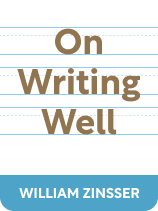

This article is an excerpt from the Shortform book guide to "On Writing Well" by William Zinsser. Shortform has the world's best summaries and analyses of books you should be reading.
Like this article? Sign up for a free trial here .
How are memoirs different from autobiographies? What is the main focus of a memoir?
In his book On Writing Well, William Zinsser discusses how to write a memoir. He says that memoirs, in contrast to autobiographies, should have a narrow focus on a specific event in one’s life.
Here are some memoir writing tips from William Zinsser.
Writing a Memoir
In a memoir, a writer describes a specific event or point in time that he experienced. Zinsser explains that unlike an autobiography—which discusses the writer’s life story—a memoir has a narrow focus. If you want to write a memoir, here are some memoir writing tips from Zinsser.
Zinsser recommends picking a specific idea, moment, or theme from your personal experience. Then write about that instance in depth, conveying the importance of that idea to you and your life. The more detailed you can be, the better. Details will paint a more complete picture of this idea or moment.
Zinsser notes that memoir writers are often timid about writing for or about themselves. He believes your story—whatever it is—is important and worth writing. Don’t doubt yourself or wonder if people will want to read it—they will.
| The Exploitation of Trauma in Online Publishing Unlike Zinsser, other experts caution writers against narrowing your focus on certain kinds of personal stories since not everyone will be receptive to some kinds of experiences—particularly traumatic ones. When writing about your personal experiences, consider the ramifications of how your story may be received, affect your job opportunities, or alter your relationship with loved ones. Many writers and editors have noticed a shift in what kinds of personal stories are in demand, stating that stories centered around intense trauma and hardship are published more than others. Experts admit that these intense stories often receive more attention, particularly online, than less extreme pieces. This publication environment places a premium on revealing trauma, thus creating an unhealthy relationship between increasing monetization or clicks and oversharing complex experiences. But many editors now worry about whether or not a writer can handle the stress of having these stories published and forever associated with their name on the internet. While in some cases, these stories may be therapeutic to write, the authors of the pieces can face backlash and judgment from readers. Some writers who have published their stories note that it’s now harder for them to write about their personal experiences after the scrutiny they faced in the past, stating that they would now reconsider publishing those stories. |

———End of Preview———
Like what you just read? Read the rest of the world's best book summary and analysis of William Zinsser's "On Writing Well" at Shortform .
Here's what you'll find in our full On Writing Well summary :
- A back-to-basics approach to the craft of writing
- How to practice simple, clear, and engaging writing—even if you're not a writer
- How to effectively put your ideas into words






